Tag: business owner
Start-Up Q&A: Jazie Fresh Meals
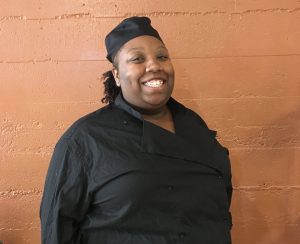 Jazie Fresh Meals
Jazie Fresh Meals
Jazie Fresh Meals is an on-demand weekly meal service that was just launched this year (2017) in Kent. Owner and chef Jasmin King joins us for an interview as one of FIN's newest Entrepreneurs.
Service Area: Pick Up or Free Delivery in Kent, $5-$10 from Tacoma to North Seattle
Availability: Orders Filled Every Sunday
Contact: (253) 259-4767
Website: jaziefreshmeals.weebly.com
Q: Tell us about your business?
I produce freshly made meals every week, which are rapidly cooled and may be reheated and consumed by my customers through the week. These meals are never frozen and are made with fresh ingredients, many of which are locally sourced. New menus are available every Wednesday and customers order by Friday for either pickup or delivery on Sunday. Customers can pick and choose how many meals and entrees they’d like to purchase and there is a discount for a full week’s worth of meals.
Q: How did you get the idea for your business? What inspired you to 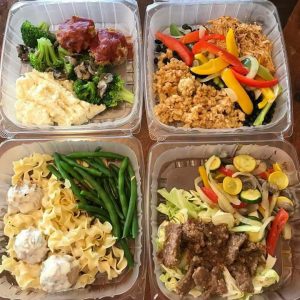 start this business?
When I started on my journey to eat healthier meals regularly, I realized how much time I put into preparing these meals. While I had the extra time, I knew most people wouldn't. I also researched blogs of folks trying meal preparation on their own. A common struggle was that people would end up having the same meal for a week at a time.
I want to help people get into a healthy eating lifestyle while not having to get stuck in the bland and boring routine that comes with not having enough time.
Q: What makes you stand out from restaurants?
My meals are prepared and quickly cooled so that you can reheat them on your own time, over the course of the week. However, a typical restaurant meal, even if it’s healthy, will only stay fresh for a day or two. Since my meals are not made for service and you receive them cold, they are able to be kept fresh for a week instead of only a couple of days like leftover takeout.
Also, unlike restaurants, my menus also change on a weekly basis so that you don't get stuck with the same five meals every week.
Q: What do you like best about your work?
I love to cook and create new dishes. The task of making them so that they keep and taste good after reheating plus the challenge of keeping them low calorie always keeps me on my toes to create something new.
Q: What is your business’ biggest challenge?
start this business?
When I started on my journey to eat healthier meals regularly, I realized how much time I put into preparing these meals. While I had the extra time, I knew most people wouldn't. I also researched blogs of folks trying meal preparation on their own. A common struggle was that people would end up having the same meal for a week at a time.
I want to help people get into a healthy eating lifestyle while not having to get stuck in the bland and boring routine that comes with not having enough time.
Q: What makes you stand out from restaurants?
My meals are prepared and quickly cooled so that you can reheat them on your own time, over the course of the week. However, a typical restaurant meal, even if it’s healthy, will only stay fresh for a day or two. Since my meals are not made for service and you receive them cold, they are able to be kept fresh for a week instead of only a couple of days like leftover takeout.
Also, unlike restaurants, my menus also change on a weekly basis so that you don't get stuck with the same five meals every week.
Q: What do you like best about your work?
I love to cook and create new dishes. The task of making them so that they keep and taste good after reheating plus the challenge of keeping them low calorie always keeps me on my toes to create something new.
Q: What is your business’ biggest challenge?
 I think the biggest challenge will be growing customer base. I am sure that once word gets out it will be much easier to keep up business. But since I’m just beginning, it may be very slow for a while.
Q: What is something people might be surprised to learn about you or your
Cooking was not my first choice in careers. I was originally interested in science, but once I started cooking meals at home I became more interested and realized how much science went into cooking. I really saw how much more fun it was to create dishes and l knew it was what I wanted to do.
Q: What types of services or programs have been helpful?
Culinary school and working in kitchens have definitely been helpful in my journey and now that I am starting I can't wait to work with FIN and Ventures. I have only begun my journey with them and am looking forward to the extra support.
Get in touch with Jasmin and check out her Facebook page for the latest menus!
I think the biggest challenge will be growing customer base. I am sure that once word gets out it will be much easier to keep up business. But since I’m just beginning, it may be very slow for a while.
Q: What is something people might be surprised to learn about you or your
Cooking was not my first choice in careers. I was originally interested in science, but once I started cooking meals at home I became more interested and realized how much science went into cooking. I really saw how much more fun it was to create dishes and l knew it was what I wanted to do.
Q: What types of services or programs have been helpful?
Culinary school and working in kitchens have definitely been helpful in my journey and now that I am starting I can't wait to work with FIN and Ventures. I have only begun my journey with them and am looking forward to the extra support.
Get in touch with Jasmin and check out her Facebook page for the latest menus!
Swahili Food Seattle
Startup Q&A: Swahili Food Seattle
 Benson, Owner of Swahili Food Seattle[/caption]
Benson, Owner of Swahili Food Seattle[/caption]
Q: Tell us about your business?
I cater East African food across King County communities. I cater small occasions, birthdays, graduations, small parties and individual meal orders. The African community loves my food because it meets their cultural appetite and is affordable. I’ve found there is a lot of interest in Kenyan cuisine outside the African community as well and I always enjoy meeting people who want to try African foods.Q: How did you get the idea for your business? What inspired you to start this business?
I saw that many Kenyans were getting very busy and did not have time to cook traditional meals. I worked in the food industry back in Kenya and have always loved to cook, I realized I could fill that need. I was number four in a family of twelve, I started cooking at a young age and everyone in my family loved my food. When I came to America, I saw that many Kenyans were busy and did not have time to cook traditional meals. The idea to start a catering business came very easily to me and I did not enjoy any other kind of job when I came to America. When I talked to family and people who knew me back in Kenya, they would always tell me I needed to start a Kenyan food business.Q: What makes you different from other types of African restaurants and caterers?
[caption id="attachment_1658" align="alignright" width="300"] Chapati, Samosas, and Goat Stew[/caption]
My recipes are based on traditional Kenyan dishes but I improvise changes that give them a local Seattle flavor as well. I learned to cook from generations of family traditions and have carried these traditions with me to America. My cooking is made from organic produce and fresh spices from Africa’s spice capital of Zanzibar – you will not be able to have only one taste.
I also cater to special needs and my clients’ timeline – responding to calls and making deliveries outside normal business hours
Chapati, Samosas, and Goat Stew[/caption]
My recipes are based on traditional Kenyan dishes but I improvise changes that give them a local Seattle flavor as well. I learned to cook from generations of family traditions and have carried these traditions with me to America. My cooking is made from organic produce and fresh spices from Africa’s spice capital of Zanzibar – you will not be able to have only one taste.
I also cater to special needs and my clients’ timeline – responding to calls and making deliveries outside normal business hours
Q: What do you like best about your work?
Flexibility, the joy of seeing people appreciate my food and services, I enjoy interacting with people and sharing the experience and food from my culture. It is always fun to meet people who have visited Kenya and for those who can’t make it all the way to Africa, I am pleased to bring my culture to them.Q: What is your business’ biggest challenge?
I am trying to grow my business so I can have my own commercial kitchen. I don’t want to run a restaurant but instead to provide catering services and supply local restaurants and grocery stores with fresh Kenyan food. In order to do this, I need capital to buy equipment and, eventually rent a large space to work from. I am challenged by financial resources to grow my business, hire staff, and expand my business ideas. For now, I am focusing on building my catering business and marketing to new customers.Q: What is something people might be surprised to learn about you or your business?
That I never went to school to learn cooking skills, they can’t understand how I taught myself to cook such tasty food.Q: What types of services or programs have been helpful?
I’m telling you, I learned something I could not have imagined with I joined FIN. I knew that I could own a business but not necessarily how to do it. For instance, I learned how to operate in a commercial kitchen and how to scale recipes for large orders. Before this I cooked by feel and taste but I needed to learn how to measure and create consistency between dishes. My next adventure will be to improve my marketing skills. [caption id="attachment_1663" align="alignleft" width="288"] Benson cooking from the FIN booth at the Federal Way Farmers Market[/caption]
Q: What would you say to other small food business owners thinking of working with FIN?
That FIN is the ultimate program for people like me with a passion for food business. I would encourage other immigrants to join FIN and be intentional about taking the advantage of available resources, FIN has resources that can meet their every food business need, their financial support is very practical, I can’t believe they paid my public health permit, there is nowhere else you can find this kind of support, FIN has treated me like a parent treats and cares about a child, it is a unique program if you are committed to the process. I would encourage them to be very persistent to the process.
Benson cooking from the FIN booth at the Federal Way Farmers Market[/caption]
Q: What would you say to other small food business owners thinking of working with FIN?
That FIN is the ultimate program for people like me with a passion for food business. I would encourage other immigrants to join FIN and be intentional about taking the advantage of available resources, FIN has resources that can meet their every food business need, their financial support is very practical, I can’t believe they paid my public health permit, there is nowhere else you can find this kind of support, FIN has treated me like a parent treats and cares about a child, it is a unique program if you are committed to the process. I would encourage them to be very persistent to the process.
Connect with Benson to make an order or volunteer.
P.S. Benson would love help with creating marketing materials.
The 2nd Annual FIN Resource Fair is Here!
We are excited to host the 2nd Annual FIN Resource Fair May 12th from 5:30-8pm at Foster High School. This year we will be bringing together resources for both entrepreneurs and community members. Folks can get help starting a food business, finding a job in the food industry, or taking food and nutrition classes. More than 20 resource providers will be participating. We will have fun children’s activities and feature food from the FIN entrepreneurs. Join us in celebrating the diversity of South King County through food! If you are interested in coming or want to invite others, visit us on Facebook.
It’s official…FIN Entrepreneurs have launched!
FIN is excited to support the launch of four new local caterers cooking out of our shared commercial kitchen in Kent. The catering businesses each received a small start-up grant and reduced rent fees and are now fully licensed and insured caterers. FIN partner, Project Feast, is a core tenant, training culinary apprentices who operate the lunch cafe, Cafe Ubuntu.
FIN is working closely with partners Ventures, StartZone and Center for Inclusive Entrepreneurship to ensure each entrepreneur is matched with a business coach, receives ongoing training and identifies market opportunities such as catering events, farmers markets, and festivals.
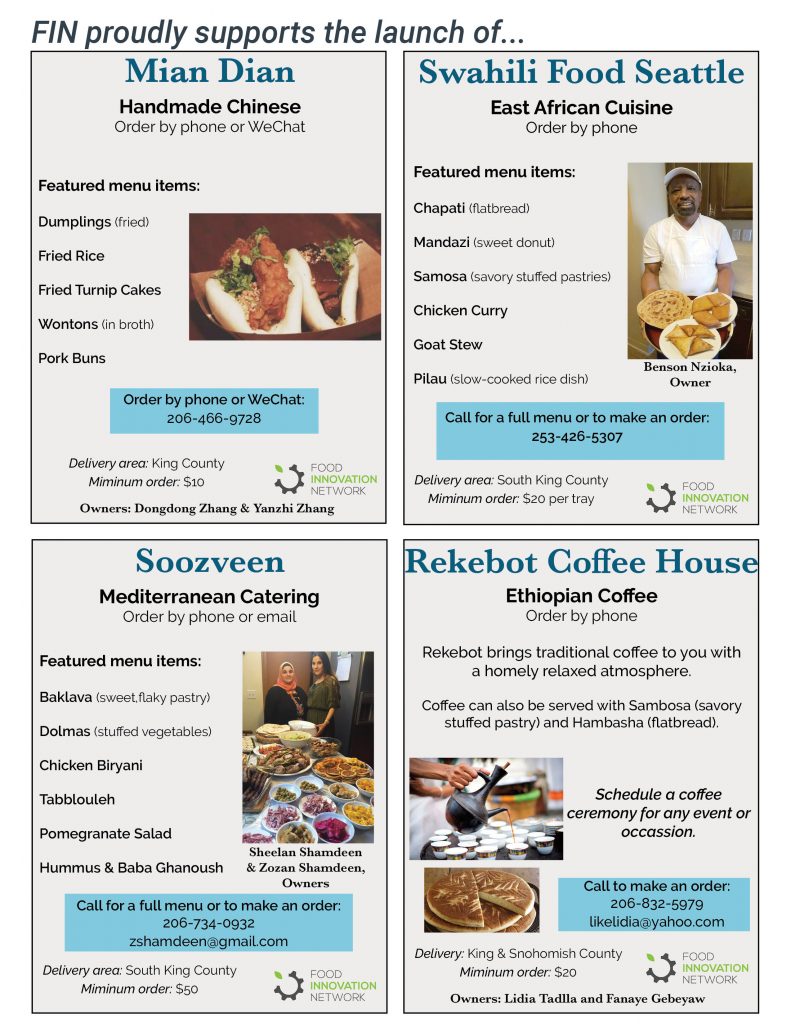 The seven entrepreneurs are operating under 4 catering businesses and will be cooking up cuisines from around the world. Swahili Seattle Food, Soozveen, Rekebot Coffee House and Mian Dian cater dishes and flavors from Kenya, Iraq, Ethiopia and China.
Many thanks for the support from Seattle Foundation, Communities of Opportunity, Port of Seattle, and City of Kent. Their generous support has helped FIN and partners to build out the commercial kitchen and ensure the entrepreneurs and apprentices have the support services needed. And a special thank you to Project Feast for spending the many hours managing the remodeling project!
If you have a catering or special event coming up, please give a FIN entrepreneur a call!
The seven entrepreneurs are operating under 4 catering businesses and will be cooking up cuisines from around the world. Swahili Seattle Food, Soozveen, Rekebot Coffee House and Mian Dian cater dishes and flavors from Kenya, Iraq, Ethiopia and China.
Many thanks for the support from Seattle Foundation, Communities of Opportunity, Port of Seattle, and City of Kent. Their generous support has helped FIN and partners to build out the commercial kitchen and ensure the entrepreneurs and apprentices have the support services needed. And a special thank you to Project Feast for spending the many hours managing the remodeling project!
If you have a catering or special event coming up, please give a FIN entrepreneur a call!
FIN’s newest staff member shares views on cultural identity as an Iraqi-American.
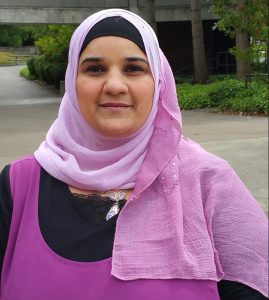
Sheelan Shamdeen, FIN Program Assistant
Sheelan Shamdeen, a Kurdish-Iraqi refugee, began working with FIN as a graduate of Project Feast’s Apprenticeship Program. Also a client of StartZone at Highline College, she and her sister found support in planning their own Iraqi catering company - Soozveen. But catering is only a small part of her story. In fact, Sheelan looks at their catering company as tool to bridge her two identities as a Kursdish-Iraqi refugee and an American citizen – food is a platform for dialogue she says. “We had 24 hours to leave and weren’t sure where we were going.” Sheelan and her family fled Iraq in 1996 when Saddam Hussein announced anyone associated with the UN would be publicly hanged. They, along with countless others, spent 3 nights under a tent with no passports - their only keepsake from home a teddy bear her sister had saved. Although they were safe once they reached Turkey, they had a long unknown journey ahead of them. Arriving in Guam, many families squeezed into tight living quarters for months while official paperwork was filed to enter the US with green cards. Twenty years later Sheelan, her mother, and seven siblings are all US citizens. Many of those years have been spent teaching English to other immigrants and refugees at Highline College. Although she remembers every detail of her life in Iraq, she also embraces American culture and encourages newcomers to do the same. “Many refugees feel this is only temporary – that this is not their home. But this is the place that helped my family survive and I believe I have two homes now.” To her, she is truly accepted in America as a human being - not a Muslim or an Iraqi but as a person. Despite the things sometimes said in media and politics, she feels like she belongs here. Sheelan doesn’t want any immigrant to lose their language or culture but believes it is important to also feel at home here. In America it is possible to celebrate both patriotism and cultural diversity in the same breath. Sharing Iraqi food with people is just one way that she can start conversations about cultural identity. Over two years have passed since Sheelan was first introduced to FIN. She was part of the first group of Community Food Advocates, recently joined the first cohort FIN Entrepreneurs and, in September 2016, took a staff position as FIN’s Program Assistant. Being a refugee means Sheelan knows what it feels like to start something from nothing. She brings compassion into her work and is quick to respond in a moment of need. All she asks of those around her is to be open minded.
Sheelan's advice to all people: “Ask questions before assuming you know someone’s story. Keep learning –there are so many free resources out there. And if you can’t find anything to learn then start a conversation with someone new.”
Over two years have passed since Sheelan was first introduced to FIN. She was part of the first group of Community Food Advocates, recently joined the first cohort FIN Entrepreneurs and, in September 2016, took a staff position as FIN’s Program Assistant. Being a refugee means Sheelan knows what it feels like to start something from nothing. She brings compassion into her work and is quick to respond in a moment of need. All she asks of those around her is to be open minded.
Sheelan's advice to all people: “Ask questions before assuming you know someone’s story. Keep learning –there are so many free resources out there. And if you can’t find anything to learn then start a conversation with someone new.”
by Allison Mountjoy January 9, 2017, 10:30AM PST
First FIN Tour: Renton Farmers Market
Attention community members interested in starting a food business working at a food business!
FIN is kicking off a series of local food business tours. Participants will get an inside look at local businesses and commercial spaces, our first being the Renton Farmers Market.
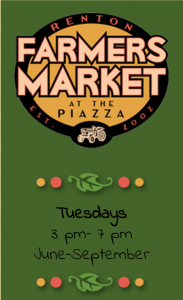 Want to sell at a farmer's market?
Join us for a FREE tour of the Renton Farmers Market. Key vendors will share stories and advice before a market tour. Tour guests will be have time to explore the market and debrief with the tour guide while sharing snacks.
Space is limited, so reserve a spot today:
Want to sell at a farmer's market?
Join us for a FREE tour of the Renton Farmers Market. Key vendors will share stories and advice before a market tour. Tour guests will be have time to explore the market and debrief with the tour guide while sharing snacks.
Space is limited, so reserve a spot today:
- Send a text to 206-370-0045
- Include the word "RENTON" and your name.
Introducing FIN Tours
The Community Engagement Work Group is getting ready to launch a year-long series of food business tours. Starting in August, one tour will be held during the last week of every month. The goal is to get an inside look at local businesses for community members interested in starting a food business or working for one. Stay tuned for event details.
Cesar Amaral, MX180 Nutrition
One of the most frightening things Cesar Amaral has ever done was to become an entrepreneur. As an entrepreneur, he says, you must take responsibility for everything. You become the deliveryman, the marketing guru, and the business developer. But if you can plan, re-evaluate, and be persistent it will all pay off. It begins with taking responsibility and most of all, pushing yourself.
Cesar’s mother passed away from diabetes in 2012 and, to him, it was a wake-up call that changed his life. Although he had built a successful career in banking he wasn’t fulfilled; he was 275lbs and wanted to turn his life around. He started simple, walking 30 minutes a day and eating small meals every three hours. As he began to improve his own health, Cesar looked to the Latino community and found alarming rates of diabetes and obesity and very few role models for health and nutrition. In taking control of his own life, it became his mission to become a role model in the Latino community and fight the diabetes and obesity epidemics.
By 2014, he had left his job in banking and become certified as a personal trainer. He was producing workout videos and holding group workout classes in Spanish in an effort to get other Latinos more active. But obesity trends were still slowly rising and he started to shift his focus to nutrition as well as exercise. After much research he developed MX180, a weight management and nutrition program for people who are overweight or obese and need to improve their health. MX180 focuses on personalized nutrition plans with Mexican style meal options, virtual personal training, and a specially developed MX180 protein shake. With the launch of MX180, Cesar has become a community leader, often speaking at schools about nutrition and healthy; he truly helps people turn their lives around 180 degrees.
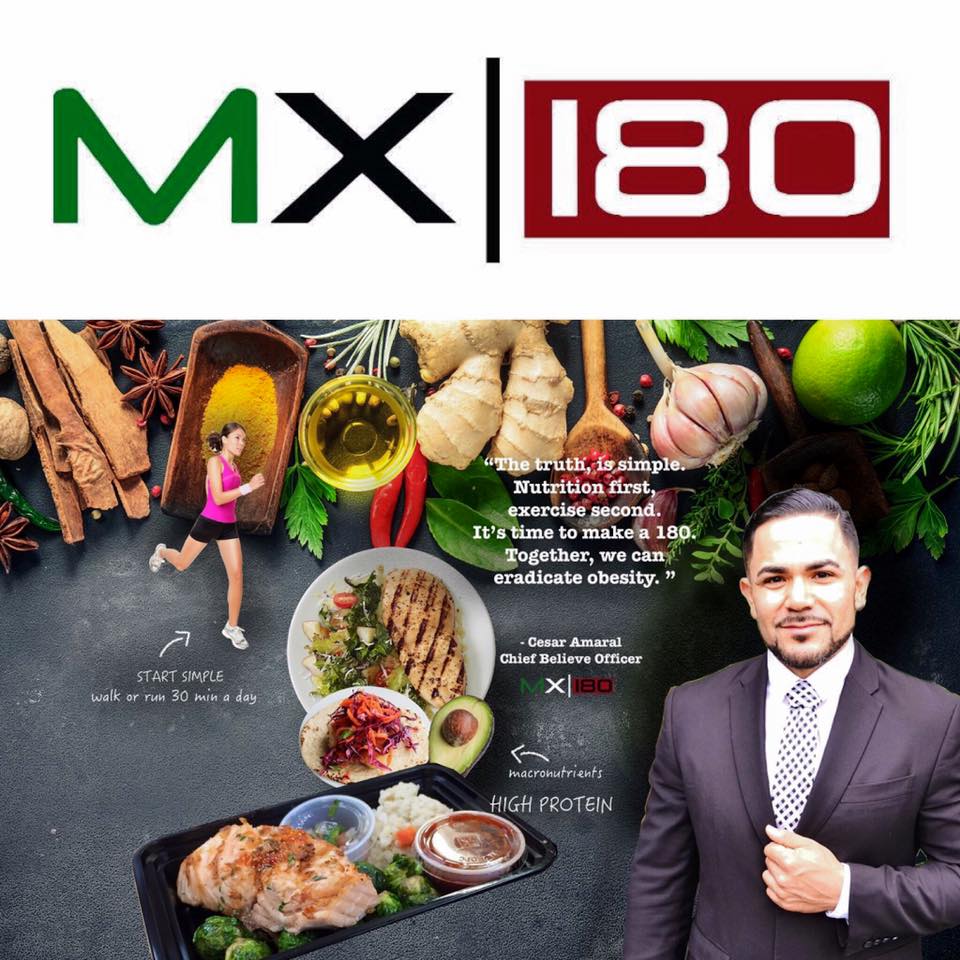 What advice does Cesar offer other entrepreneurs?
“Always connect to like-minded people. A majority of the world will tell you you’re not going to make it so it’s important to believe in yourself because the euphoria wears off. When you start something it’s so new and you’re so determined, but what will you do a few months from now when you are tired and run-down? During the dark moments you really need to dig in, get out of bed, and find people who will help keep you motivated.”
“Dig in, believe in yourself, and go for it.”
What advice does Cesar offer other entrepreneurs?
“Always connect to like-minded people. A majority of the world will tell you you’re not going to make it so it’s important to believe in yourself because the euphoria wears off. When you start something it’s so new and you’re so determined, but what will you do a few months from now when you are tired and run-down? During the dark moments you really need to dig in, get out of bed, and find people who will help keep you motivated.”
“Dig in, believe in yourself, and go for it.”
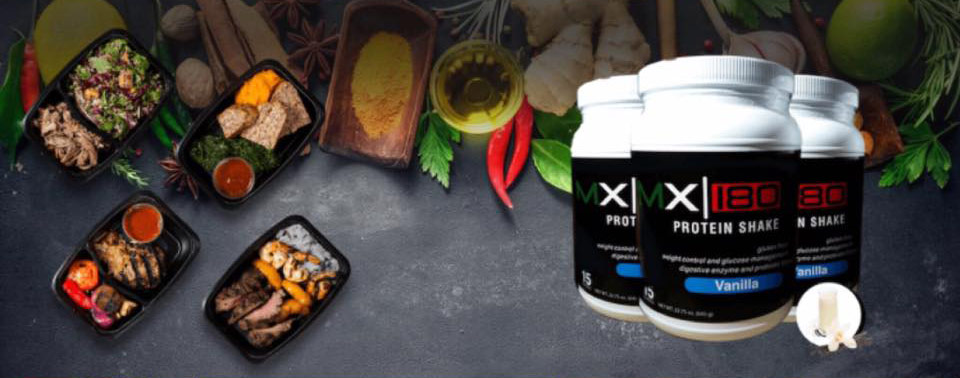 If you're ready to take control of your life by forming new healthy habits, try the MX180 30-Day Plan. For more details call (206) 853-9847.
Check out the MX180 website and connect with them on Facebook and Instagram.
If you're ready to take control of your life by forming new healthy habits, try the MX180 30-Day Plan. For more details call (206) 853-9847.
Check out the MX180 website and connect with them on Facebook and Instagram.
Elaine Brand, In Your Face Pie Company
In Your Face Pie Company owner Elaine grew up in the Bronx, New York with her artist minded family. Her father made wooden toys that functionally disabled adults would sand, paint, and sell. Elaine watched her father, knowing one day she too would give back to her community.
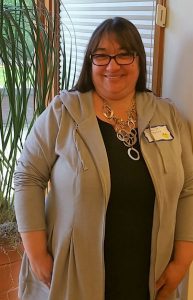 Years later, after her husband's job offer in Seattle fell through, she felt dangerously close to not being able to provide for her daughter. Before moving to Seattle Elaine had earned undergraduate degrees in Acting & Directing, Technical Theatre, and a Master’s degree in Performing Arts Management. Upon leaving NYC, it became difficult to find work as many employers felt she was overqualified for the positions available. “No one wanted to hire me. I had a child at the time and I just needed a job.” Although her husband eventually found a new job and supported them, she wanted to make something of herself. Elaine's father was the first to suggest that she begin a career in baking.
Elaine fell in love with the idea and immediately enrolled in baking courses, eventually earning a certificate in Pastry and Specialty baking and learning the operations skills necessary to run food catering business. She quickly opened a chocolate company and eventually a small catering company. Eventually she closed the doors on both businesses and focused on raising her two daughters until they graduated high school. Though her passion for owning food businesses never faltered.
Years later, after her husband's job offer in Seattle fell through, she felt dangerously close to not being able to provide for her daughter. Before moving to Seattle Elaine had earned undergraduate degrees in Acting & Directing, Technical Theatre, and a Master’s degree in Performing Arts Management. Upon leaving NYC, it became difficult to find work as many employers felt she was overqualified for the positions available. “No one wanted to hire me. I had a child at the time and I just needed a job.” Although her husband eventually found a new job and supported them, she wanted to make something of herself. Elaine's father was the first to suggest that she begin a career in baking.
Elaine fell in love with the idea and immediately enrolled in baking courses, eventually earning a certificate in Pastry and Specialty baking and learning the operations skills necessary to run food catering business. She quickly opened a chocolate company and eventually a small catering company. Eventually she closed the doors on both businesses and focused on raising her two daughters until they graduated high school. Though her passion for owning food businesses never faltered.
 Inspired by her father's philanthropic heart and her daughter's career in the Marines, Elaine began dreaming of a pie company. She set out to start a pie cafe where anyone who walked in the door would feel at home. In addition to her pies she would also provide employment and assistance to retired veterans.
To start this new journey, Elaine enrolled in courses at Start Zone which led her to make connections with the Food Innovation Network and later Ventures. Through being tenacious and hardworking she graduated from Ventures’ Business Development Training program, received both her LLC and business license, and is working on developing the catering side of her business. Her company features over 40 varieties of sweet and 18 varieties of savory pies.
What advice does Elaine have for other budding entrepreneurs? “Learn everything you can about your business and be a champion for your business. You have to want it, you have to want so bad that you can taste it. And I can really taste it.”
Inspired by her father's philanthropic heart and her daughter's career in the Marines, Elaine began dreaming of a pie company. She set out to start a pie cafe where anyone who walked in the door would feel at home. In addition to her pies she would also provide employment and assistance to retired veterans.
To start this new journey, Elaine enrolled in courses at Start Zone which led her to make connections with the Food Innovation Network and later Ventures. Through being tenacious and hardworking she graduated from Ventures’ Business Development Training program, received both her LLC and business license, and is working on developing the catering side of her business. Her company features over 40 varieties of sweet and 18 varieties of savory pies.
What advice does Elaine have for other budding entrepreneurs? “Learn everything you can about your business and be a champion for your business. You have to want it, you have to want so bad that you can taste it. And I can really taste it.”
Dieynaba Kouyate, Saran African Market
SeaTac business owner, Dieynaba, opened Saran African Market in 2010 in honor of her mother, Saran, who owned and operated a food wholesale and distribution business in Côte d’Ivoire. Dieynaba’s own journey began when she immigrated to the US in 2002, following the passing of both of her parents, with the goal provide financial support for her family back home. Her arrival to the US, however, was met with several drawbacks, one of them being her departure from university where she was studying math, physics, and chemistry. Instead of the promising land of opportunity, Dieynaba was met with a confusing immigration system and highly competitive job market. Language barriers, inability to continue school with her visa, and the high cost of living made it difficult to send money home.
Dieynaba found herself braiding hair to make ends meet, while she worked toward her entry into the US job market. Within that time she began to build a reputation for herself within the West African community and within Dieynaba noticed a vital need for more access to African goods within the community. By gathering community feedback she was able to open a shop that caters to her community's needs and showcases the cultural resources of many African communities. Saran African market carries goods that are otherwise hard for her community to find including food, personal products, clothing, and a hair braiding salon in the back.
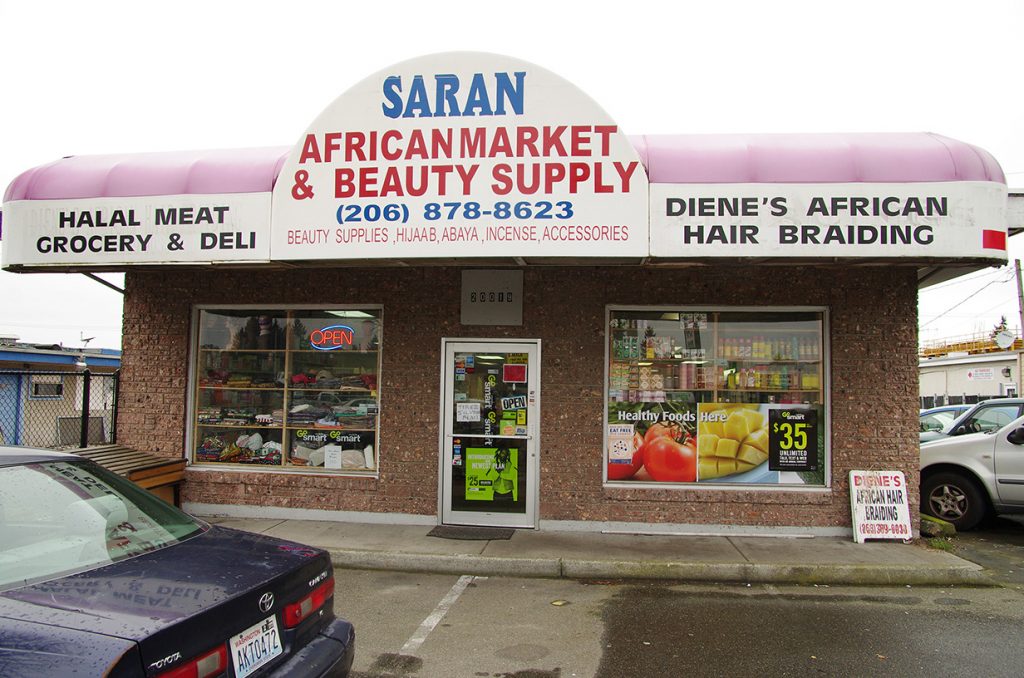 For the past five years her shop has grown in its success and popularity but with the introduction of the new light rail station, and rising costs of rent, the future of Dieynaba's business is filled with rising uncertainty. The 200th Street light rail station, less than a block away and scheduled to open late 2016, has come with the promise of increased store traffic and sales. Over a year of construction though, has brought only a crammed parking lot, off-putting noise from construction, and so much dust that Dieynaba has had to close her back-of-store salon.
Keeping stock of her most popular items, like smoked catfish and cassava products, helps the community stick with her during construction. She hopes these same products will bring in new customers from the station; some happy to find a reminder of back home and others seeking to experience the diversity of SeaTac. If the light rail station is able to deliver on such promises, Dieynaba will be able to take the next step in her business. While much of her food products are imported, Dieynaba dreams of a future where she owns a piece of land to grow and process some of these items locally.
[gallery link="file" ids="519,520,521,522,523,524,525,526,527"]
What advice does Dieynaba have for other budding entrepreneurs? “Save money and plan ahead. It’s good to have at least six months to a year’s worth of savings before opening a business, also take workshops in bookkeeping and cash flow as you’ll find them to be helpful with your business.”
For the past five years her shop has grown in its success and popularity but with the introduction of the new light rail station, and rising costs of rent, the future of Dieynaba's business is filled with rising uncertainty. The 200th Street light rail station, less than a block away and scheduled to open late 2016, has come with the promise of increased store traffic and sales. Over a year of construction though, has brought only a crammed parking lot, off-putting noise from construction, and so much dust that Dieynaba has had to close her back-of-store salon.
Keeping stock of her most popular items, like smoked catfish and cassava products, helps the community stick with her during construction. She hopes these same products will bring in new customers from the station; some happy to find a reminder of back home and others seeking to experience the diversity of SeaTac. If the light rail station is able to deliver on such promises, Dieynaba will be able to take the next step in her business. While much of her food products are imported, Dieynaba dreams of a future where she owns a piece of land to grow and process some of these items locally.
[gallery link="file" ids="519,520,521,522,523,524,525,526,527"]
What advice does Dieynaba have for other budding entrepreneurs? “Save money and plan ahead. It’s good to have at least six months to a year’s worth of savings before opening a business, also take workshops in bookkeeping and cash flow as you’ll find them to be helpful with your business.”
